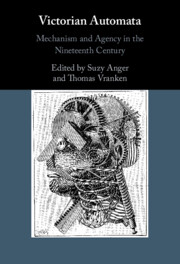Book contents
- Victorian Automata
- Victorian Automata
- Copyright page
- Contents
- Figures
- Contributors
- Introduction
- An Afterthought on Victorian Automata as Afterthought (and Signifier)
- Part I Mechanical Automata
- Part II Automatism
- Part III Literary Genre and Popular Fiction
- Chapter 9 The Automaton Detective
- Chapter 10 “A Doll, a Dummy, a Nothing!”
- Chapter 11 The Invasion of the White Mind
- Part IV Interactions
- Index
Chapter 10 - “A Doll, a Dummy, a Nothing!”
The Criminal Mesmerist, His Automaton-Subject, and Debates on Criminal Responsibility in Richard Marsh
from Part III - Literary Genre and Popular Fiction
Published online by Cambridge University Press: 15 March 2024
- Victorian Automata
- Victorian Automata
- Copyright page
- Contents
- Figures
- Contributors
- Introduction
- An Afterthought on Victorian Automata as Afterthought (and Signifier)
- Part I Mechanical Automata
- Part II Automatism
- Part III Literary Genre and Popular Fiction
- Chapter 9 The Automaton Detective
- Chapter 10 “A Doll, a Dummy, a Nothing!”
- Chapter 11 The Invasion of the White Mind
- Part IV Interactions
- Index
Summary
This chapter studies Richard Marsh’s unexplored fiction on criminal mesmerism (The House of Mystery, “A Psychological Experiment,” “How He Passed,” “The Woman with One Hand”) alongside The Beetle, to analyze how mesmerized subjects are portrayed as automatons, seemingly devoid of agency/power. Drawing on the complex material history of automaton-objects and nineteenth-century psychological theories of automatized human behavior, the figures of mesmerized automatons in the texts complicate the usual association of automatons with technophobic anxiety. They also complicate the fraught issue of criminal responsibility, projecting difficult questions of volition/power that inhabit the crimes/injustices committed, or enabled, through an automaton. The automaton-like humans fracture the established nineteenth-century connection between mesmerism and painlessness, underscoring the inner (moral) agony of the automata – who in these texts are usually class/gender outsiders. As such, Marsh’s texts on criminal mesmerism stage an ethical intervention by showcasing the automatized subjects’ pain as their protest against socioeconomic injustices.
Keywords
- Type
- Chapter
- Information
- Victorian AutomataMechanism and Agency in the Nineteenth Century, pp. 208 - 228Publisher: Cambridge University PressPrint publication year: 2024

